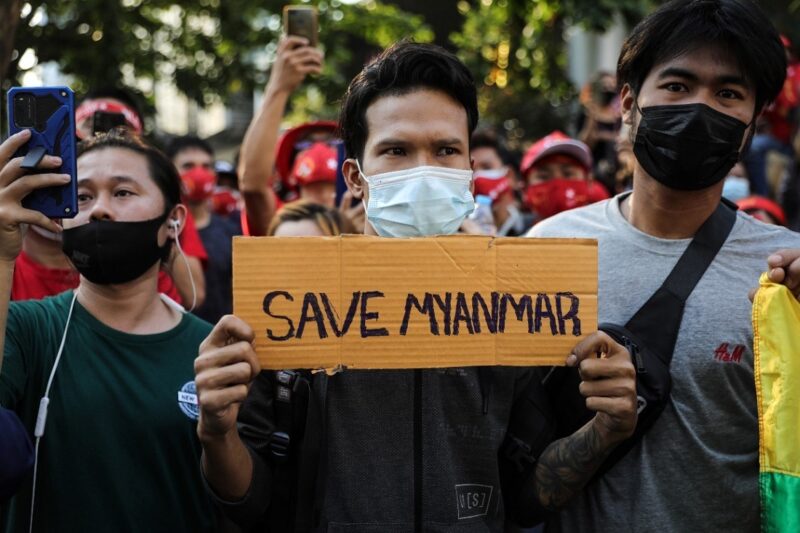
These days, Beijing has described what happened in Burma as “a major cabinet shakeup.” Meanwhile, for Washington, London, and the European Union, it is a clear military coup. A month ago, General Min Aung Hlaing, leader of the military junta that will rule Burma after the coup on Monday, met with Chinese Foreign Minister Wang Yi. A meeting baptized as “fraternal” by the press of the Asian giant. “China appreciates that the Burmese army takes national revitalization as its mission,” Wang said.
After that meeting, some Burmese media highlighted that their military shared with the Chinese minister their complaints about the alleged fraud that occurred in the last elections on November 8, in which the National League for Democracy (NLD), the party that Aung San Suu Kyi leads, he had swept the elections with more than 80% of the seats in Parliament. In addition, the local press reported that before Wang returned to Beijing, General Min Aung Hlaing could have shared with him the future movements of the Army after contesting the results of the elections.
The international response to the military coup in Burma was almost unanimous. The United States and the European Union called for the restoration of democracy, as well as the release of Aung San Suu Kyi and the other detained politicians and activists. The new US president, Joe Biden, warned that his administration would reimpose sanctions on the Asian country. Even the 15-nation UN Security Council held an emergency closed-door meeting Tuesday afternoon to address its reaction to the military coup in Burma.
At the end of the meeting, it was expected that a statement would be made public with a firm condemnation of what happened in Burma. But China, the largest trading partner of the Southeast Asian country, which has the right to veto for being a permanent member of the Council, has prevented – like Russia with its negative vote, according to the draft of the resolution published by the BBC – that the condemnation of the UN Security Council was approved.
“Western countries have been very aggressive, directly demanding that the Burmese army take immediate action to reverse the situation, and their interference has become part of Burma’s problem,” reads an editorial published after the UN meeting by the Global Times, a newspaper that serves as the aggressive media spokesperson for the Chinese Communist Party. “When the country is experiencing turbulence, we should not exacerbate the problem, but try to calm it moderately,” he continues.

Throughout the week, from Beijing, which already protected the Burmese military from international sanctions after the Rohingya genocide of 2017, they have been restrained in criticizing the new military government of their neighboring country. So equidistant that, this Wednesday, during the daily press conference of Wang Wenbin, spokesman for the Chinese Foreign Ministry, journalists have asked him if Beijing supports or gave its consent to the coup in the Asian neighbor.
Those theories are not true, we want all parties in Burma to be able to resolve their differences and uphold political and social stability, “said Wang.” The international community must create a good external environment so that Burma can resolve its conflicts appropriately. ” added the spokesperson. Historically, China has supported the military dictatorship that was in command in Burma from 1962 to 2010. Although it is also true that, during the decade of near democratic that the country has experienced, Chinese leaders have maintained good relations and multiple meetings with Suu Kyi, who made several trips to Beijing and supported President Xi Jinping’s Belt and Road project to expand his commercial dominance throughout Asia.
China’s silent stance in the face of the military coup is understood as the intention not to interfere in the internal affairs of a country in which they will continue to invest and sign trade agreements, regardless of who is in power. That has never mattered to the Communist Party. From the Beijing Foreign Ministry, faced with questions from this newspaper in this regard, some officials recall that General Min Aung Hlaing, who decreed a state of emergency for a year, has said that, in February 2022, new ones would be held. democratic elections to elect new leaders.
They are internal affairs of the neighboring country, if the West insists on sanctions it will only make things worse,” said Chinese officials, who do not consider that the UN Security Council has not reached an agreement to condemn the coup. after China’s veto.More forceful has been the statement of the G7, formed by Canada, France, Germany, Italy, Japan, the United Kingdom, and the United States. We call on the military of Burma to immediately put an end to the state of emergency, restore power to the democratically elected government, release all those unjustly detained and respect human rights and the rule of law.








